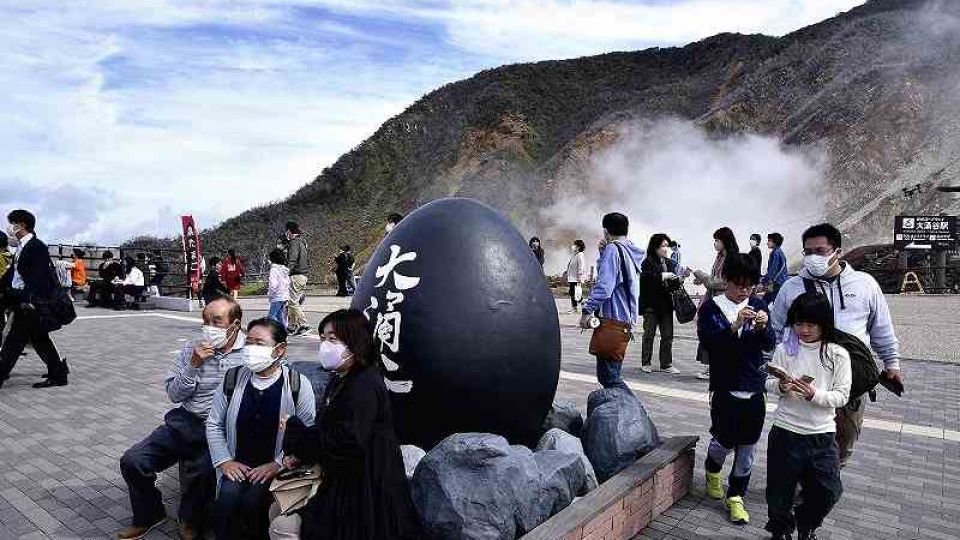October 12, 2022
TOKYO – Japan welcomed individual foreign travelers into the country for the first time in two and a half years Tuesday, boosting expectations that the easing of restrictions coupled with the weak yen will be a tailwind for the tourism sector.
The government has set a target of ¥5 trillion in annual spending by foreign visitors to Japan, higher than the level seen before the COVID-19 pandemic hit the country, but a full-fledged recovery is likely to take time.
Autumn holiday season
The fall holiday season is set to kick off in the resort town of Hakone in Kanagawa Prefecture, which is famous for its autumn foliage.
Since September, the Fukuzumiro ryokan inn has been receiving a steady stream of reservations from foreign customers, exceeding 300 for the period from October through December.
Fukuzumiro, which was built in the “sukiya-zukuri” architectural style, had been popular among foreign visitors before the pandemic. In 2019, approximately 7,600 foreign visitors stayed at the ryokan, accounting for 80% of the total number of guests. However, the number dropped to 645 in 2020 and 22 in 2021. “We have been looking forward to the easing [of restrictions],” said a manager at the hotel.
Following Prime Minister Fumio Kishida’s announcement about the drastic easing of border control restrictions in September, Taiwan online travel booking platform KKday said the number of bookings for Japanese trips was 20 times higher among customers from South Korea and 8 times higher among customers from Taiwan, compared to August. Tokyo and Osaka tours were said to be popular on the platform, which boasts more than 7 million members in Asia.
In June, Japan opened its borders to foreign tourists on guided package tours. But the cap on international arrivals and time-consuming visa procedures blighted chances of a swift recovery in the tourism sector.
The industry has been preparing for an anticipated influx of international visitors. In 2021, Hoshino Resorts Inc. opened three hotels in Kyoto, which hosted 8.86 million foreign tourists in 2019, and the hotel giant has produced tourist maps with information in multiple languages.
At New Chitose Airport, South Korea and Taipei routes were restored in July and August, respectively. The Hokkaido prefectural government has established a program to support foreign airlines that have resumed regular international flights.
On Oct. 1, JR East increased services on the Narita Express train that links Narita Airport in Chiba Prefecture to Tokyo. Operations had been partly suspended due to a decline in passenger numbers.
Mask mishaps
Unlike in other countries, masks are still commonly worn in Japan, raising concerns that an influx of foreign visitors who do not observe local etiquette vis-a-vis mask-wearing could lead to issues in hotels, shops and on public transport.
The Japan Tourism Agency is calling on the hotel industry and others to ensure that foreign guests observe mask-wearing rules. The Shinjuku Prince Hotel has posted signs in English urging foreign guests to wear masks and disinfect their hands upon entering the hotel.
Kishida said he hopes to achieve annual spending of over ¥5 trillion by overseas visitors to Japan in his policy speech at the Diet on Oct. 3, exceeding the 2019 figure of ¥4.8 trillion.
The weak yen means trips to Japan are less expensive for many foreign visitors. The yen has been trading at more than ¥140 to the dollar recently.
The government hopes that the increase in the number of overseas visitors to Japan will help shore up the economy.
Takahide Kiuchi, an executive economist at Nomura Research Institute, Ltd., estimates that the eased border restrictions will bring about an economic effect worth ¥2.1 trillion in 2023, equivalent to 0.4% of the country’s nominal gross domestic product (GDP).
Based on the situation in Europe and the United States, which have already opened their borders, foreign tourism to Japan is expected to recover to pre-pandemic levels in the second half of 2024.
However, issues need to be addressed before a recovery can be expected.
Thai Airways went bankrupt in 2020 amid the pandemic, which delivered major blows to foreign low-cost carriers that operate routes to Japan.
An airline industry official said such airlines “might not have the capacity to immediately resume flights to Japan.”

The Yomiuri Shimbun

